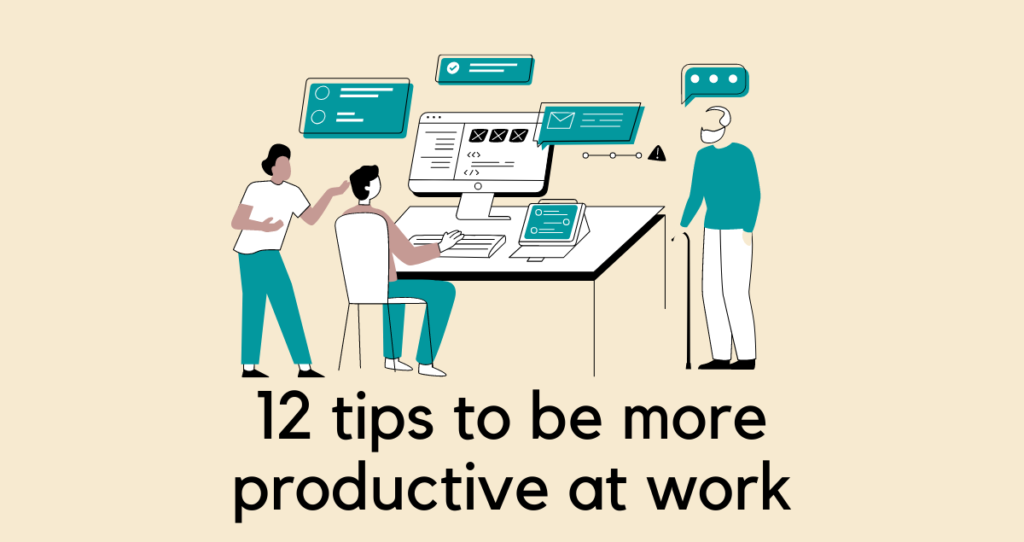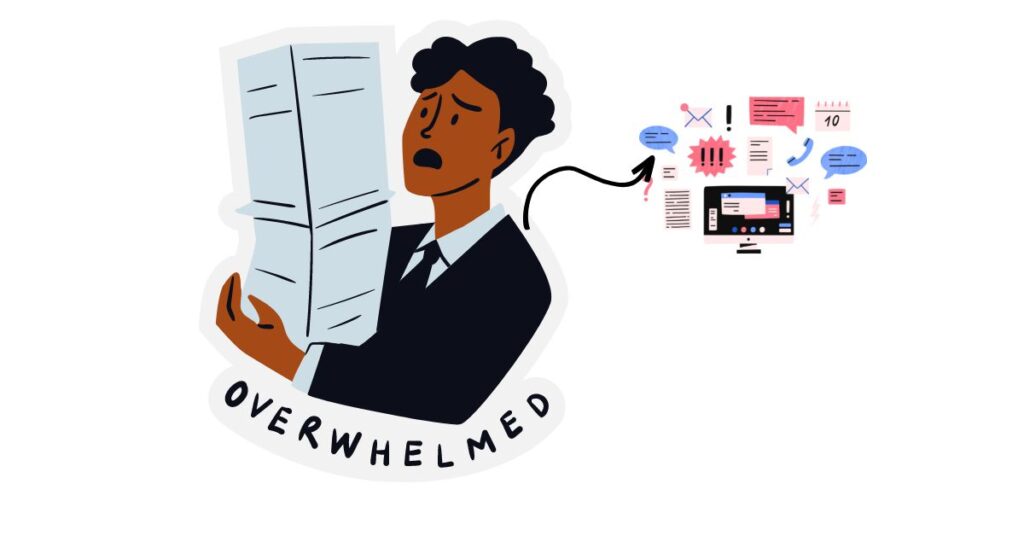Do you ever feel overwhelmed and exhausted from work-related stress? You are not alone. Millions of people experience job-related frustrations on a regular basis. Whether it’s feeling undervalued, having too much on your plate, or knowing you can do better, workplace frustrations can take an emotional toll. In this article, we’ll discuss what causes frustration at work and how to take control of it.
If you are a person in a position of power such as a supervisor, a manager, a business owner, etc., this article is for you as well. This article will make it clear what causes frustrations at work and how you can identify and correct them. You’ll also learn more about the cultural, interpersonal, and task-based factors that can lead to frustration at work, as well as practical tips for coping with these feelings.
Without further ado, let’s get started.
1. Too much work
If you find yourself working like a machine and taking on all responsibilities, frustrations will be around the corner. Working too much is one of the many causes of frustration at work for millions of people. The rise of inflation has made goods and services more expensive than ever. That means you have to work more to afford the same things you used to afford in the past.
Instead of working one job, some people are working two to three jobs. Others are clocking in 80+ hours per week on their 9 to 5 jobs. This kind of work comes with physical and mental fatigue which leads to frustration.
There should be a balance between work and life. If you are frustrated every day due to overworking, take time off, change jobs, or simply work fewer hours. You can also change your lifestyle in order to sustain yourself with a low income. Your life and health come first, and therefore, working meaningful hours is one way to take care of yourself.
2. Lack of control or autonomy
Too much control over employees is one of the causes of frustration at work. As a manager or a supervisor, it is important to understand what really motivates each and every one of your employees. Yes, there are many factors that contribute to employees’ lack of happiness. One of them is the lack of control and autonomy in a work environment.
Employees need to know that they are in charge of their own work. Each employee needs to know that they are contributing and making a difference and that the work they do is valuable. No one wants to stay in a place where they don’t have the freedom to do their jobs or where they are manhandled.
To reduce the frustration associated with the lack of autonomy, let your employees do their jobs. The only thing you have to do is to give them the support, resources, tools, and training they need to successfully do their jobs. Then monitor their performance without overpowering them with your authority.
3. Lack of recognition and appreciation
The lack of recognition contributes to frustration in the workplace. None wants to work hard every single day and go beyond expectations without getting compensation for it or being recognized for the work they have done. Many managers and supervisors never understand why their employees are always frustrated when the answer is in front of them. If someone works hard, that person should be compensated or recognized. What causes frustration at work? People with power never recognize their hard-working employees.
For example, let’s assume that each employee is expected to build 5 parts per day. But, since all employees don’t have the same work ethics and abilities, some employees can do more than 5 parts. Now the question is, “Why would anyone does more than they are expected to every single day without being compensated or receiving recognition for their hard work?”
If your employees do more than you expect them to do, but you do not recognize their efforts, they will be frustrated. Why? Because they are working more than the rest of the team for the same pay. In addition, it is like you don’t care about their effort and yet, you are ripping all the rewards from their sweat. You are the one getting the bonus, the promotion, etc. But they (your employees) are the ones doing all the hard work. If you did not know, this is one of the most common causes of frustration at work.
This cause of frustration is so deep that some of your employees will slow down. Those who cannot afford to slow down due to their workaholic mentality will quit their jobs to go where their hard work is recognized and compensated.
Related: 13 reasons why businesses fail really quick
4. Unclear expectations cause frustration at work
One of the main causes of frustration at work is unclear expectations. This point sounds simple but too many employees get frustrated because they have no idea of what is expected from them. As a business owner, manager, or supervisor, you should have clear expectations from your team.
To reduce work-related stress, expectations should be properly communicated to your employees. Think of being at a place working tirelessly without knowing when you are going to stop or how much work you are supposed to be doing.
You don’t know if you are doing too much or too little. What you know is that you are physically and mentally tired. The lack of communicated expectations is one of the leading causes of frustrations at work.
To make sure that you reduce this form of frustration, always communicate with your team what the expectations are and the timeline. Everyone will work knowing how much work they need to do without doing more or less. Employees will know when they have reached the goal and choose to do more if they want to or relax when they need to do so. But having your employees do more than they are supposed to be a form of deception and violates the ethics and morals of work environments.
5. Unrealistic deadlines
If you did not know, unrealistic deadlines are major causes of frustration at work. Yes, it is good to set the bar high to maximize the productivity and resources you have. But, setting the bar too high is never a good idea in a work environment.
You see, setting unrealistic deadlines means that you are asking your employees to do more and push themselves to the limit. It is like you are asking them to work like machines, have sleepless nights, and work more than they are being paid for. After a while, the job starts feeling like it is no longer a job. Employees start feeling like they are hustling and fighting for their life.
Unrealistic deadlines always break employees and lower employee retention rates. There is always a breaking point. A point where employees start questioning how much they are being paid and the work they do. Overworking your employees and imposing unrealistic deadlines leads to too much frustration at work.
Some employees will choose to go where they get paid less for a realistic work environment. Any work environment that does not promote the health and well-being of its employees cannot retain them.
6. Poor delegation of tasks and lack of proper training
Every employee at work should have specific tasks that correspond to their job specifications, experience, and skills. Employees are not supposed to be assigned to tasks where they are not properly trained or where they have no idea of what they are doing without anyone guiding them.
Poor delegation of tasks is one of the many causes of frustration at work. Not knowing what to do automatically boil employees down and causes them to be emotionally frustrated. You are asking your employees to do their work, but they don’t know what they are doing. No one wants to be in such an environment.
Never ask your employees to do assignments they are not trained for. In addition, never ask your employees to perform takes they are not comfortable doing.
What you can do as a manager, or a supervisor is to look at the job at hand and assign each task to an employee who can perform it best. You can also evaluate what each employee likes to do and the resources you have when assigning tasks.
If you want employees to perform any task in your department with less frustration, then do cross-training. Have employees move from one area to another over time until they have mastered all areas in the department. For example, if you are down and missing something, use that time to train employees on specific tasks instead of sending them home (if you can afford to do so).
7. A sense of powerlessness
Just like your employees need a sense of autonomy and control, they also need to feel like they have some kind of power. That is most employees like jobs where they can make a difference and bring meaningful change.
The feeling of powerlessness is a major cause of frustration in a work environment. In many places, employees get frustrated when they have no power to make changes and no one to talk to. For example, if an employee suggests something that will make the job easier and faster, and you dismiss it, that employee will definitely be frustrated.
Why? Because you are asking them to keep doing their job the hard way when they know there is an easier way to do it. If the entire management team is like that, employees will feel stuck and unable to make changes.
As a manager or supervisor, you should always ask your employees this simple question. What can I do to make your job easier? This question is important because your employees are the ones who do the job. If there is anyone who can bring positive change is your employees. They know what works and what does not work. So, value their opinion and give them a sense of power.
8. Unhelpful or unsupportive colleagues
A toxic work environment is one of the leading causes of frustration at work. Let’s face it. None wants to be surrounded by coworkers who don’t offer support or contribute to getting the job done. This also applies to working with lazy people. When employees are teamed up with lazy people, they end up doing all the work. That is not a good setup in a work environment.
To address this issue, you need to constantly evaluate how employees are doing their jobs but also how effectively they are working together. It is also important to have surveys where people rate their jobs, assignment, and issues they face. When an employee brings up concerns, it is always a good idea to follow up and figure out answers. The more you show employees that you care about them, the better the work environment you will create.
9. Unresolved conflicts /disputes and clash of personalities
Every issue such as disputes, conflicts, etc. that rise in a work environment should always be addressed and resolved. The lack of conflict and dispute resolution is one of the biggest causes of frustration at work.
Let’s take a hypothetical example. Let’s assume that an employee comes to you and said,” My coworker called me a bad word or insulted me.” As a manager or supervisor, you should respond to this dispute immediately and do some investigation. You need to get to the bottom of the problem.
If you choose to do nothing, the person who was insulted will feel guilty about telling you about the issue. They risked being vulnerable by expressing their concerns and now you tossed their problem out of the window. Deep inside, fear, neglect, and the thought of lack of support will start visiting their minds. They will feel like you and the company does not care about their well-being. So, employees will be frustrated.
On the other hand, the offender will start thinking that it is OK to do what they did. Instead of correcting them and firing them when you have to, things will get much worse. The lack of action will make them think they can do it again to anyone in the company. Over time, your work environment will change into a toxic place that none will want to work or be associated with. Frustration will be the norm and your employee retention rate will degrade.
Related: 16 best employee retention strategies that work for 2022
10. Poor management is a major cause of frustration at work
Poor management is one of the leading causes of frustration at work in a number of ways. The lack of proper management can lead to micromanagement which can limit employees from taking initiative or from having ownership over their work. This lack of trust can lead to employees feeling powerless and frustrated.
Additionally, poorly managed workloads can lead to excessive stress, which can be very demotivating for employees. Poor communication from managers can also lead to confusion and frustration among employees as they may not be clear on expectations or timelines. Finally, if managers are not setting clear goals and providing feedback, employees can become discouraged as they may not know how they are performing and how they can improve.
11. Insufficient or unresponsive feedback
Insufficient feedback can cause frustration at work because it prevents employees from improving their performance, gaining recognition for their work, and having a sense of accomplishment. Without feedback, employees never recognize how their efforts are translating into results, and that can lead to a feeling of frustration.
Without feedback, employees don’t have the opportunity to understand their successes and failures in the workplace, and thus can’t adjust their behavior to ensure better results. In addition, employees can’t improve their performances which leads to a lack of job satisfaction and frustration.
12. Lack of communication
Lack of communication at work can lead to frustration by causing misunderstandings and lack of clarity. Effective communication in a work environment should be simple, clear, and direct. The lack of communication at work leads to confusion, lack of trust, and uncertainty. Employees may feel that their questions and concerns are not being heard or addressed. Which can worsen their feelings of frustration and can have a negative effect on productivity and team morale.
The bottom line
From the lack of recognition to miscommunication and unsolved conflicts, these factors and many more are major causes of frustration at work. Companies should prioritize understanding the employee experience, cultivate meaningful working relationships, and create a culture of respect in order to foster a productive and emotionally supportive work environment. It is important to empower employees’ sense of worth and value. Furthermore, it is equally important to remind ourselves that every individual has an important role to play.
Frustration at work can be addressed if we:
- Focus on improving the connection between employers and employees,
- Promote open communication, and
- Actively reduce stress and anxiety in the workplace.
By doing so, we can move forward with a shared sense of purpose and a common goal. In addition, this culture can help to create a space where everyone can thrive and reach their highest potential.
It is essential that employers take the initiative to ensure their teams are comfortable, supported, and heard. After all, it is only through a collaborative and understanding environment that employers can truly understand the importance of workplace satisfaction.









